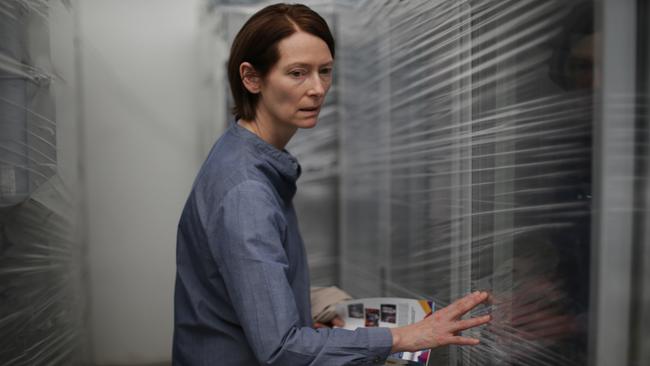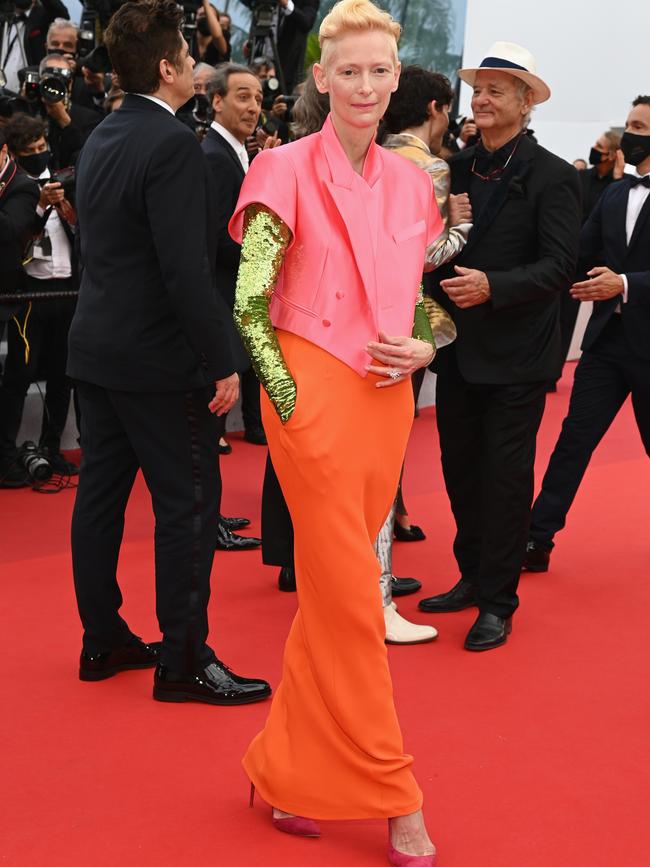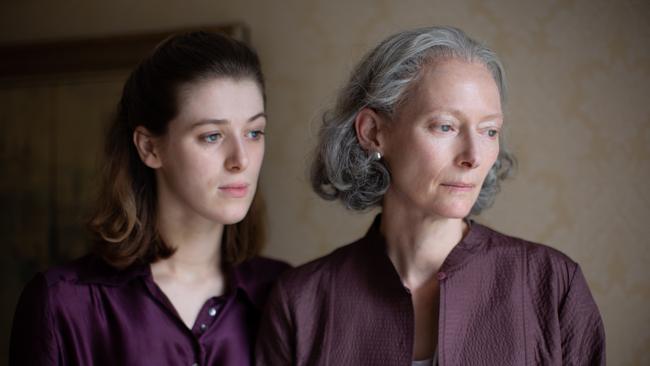Tilda Swinton keeps the mystery alive in Memoria
Tilda Swinton is always beguiling and adventurous in her choice of roles, and her latest movie is no exception.

From starting out in Derek Jarman’s trailblazing films, Caravaggio and Edward II and in Sally Potter’s gender-fluid Orlando, the beguiling Scottish actor Tilda Swinton has been adventurous in her choice of roles and she tends to team up repeatedly with similarly visionary directors.
After acclaimed director Wes Anderson cast Swinton in Moonrise Kingdom, he said he couldn’t imagine making a film without her – and he hasn’t since.
And after Jim Jarmusch cast her in a small role alongside Bill Murray in Broken Flowers, she starred as a 3000-year-old vampire in his sensual cult vampire story Only Lovers Left Alive alongside the 20-years-younger Tom Hiddleston, and then in 2019’s The Dead Don’t Die she appeared as a Scottish samurai sword-wielding undertaker who turns out to be an alien.
Following her turn as a buck-toothed bespectacled despot in Bong Joon Ho’s Snowpiercer, she reteamed with the director for Okja as another broadly drawn evil authority figure, in fact two, as she played twin sisters, (not long after she portrayed twin gossip columnists in The Coen Brothers’ Hail Caesar!). Alas, Bong cast Korean actors solely in his Oscar-winning Parasite, but Swinton had another Asian director, Thailand’s Apichatpong Weerasethhakul, in her orbit after she saw the director’s Tropical Malady which won the Jury Prize at Cannes, where she served on the 2004 jury.
“We were really blown away by his film and I quickly made sure that I saw everything of his that I could,” Swinton, 61, recalls. “I’m a complete superfan of his world. It’s not a logical universe. It’s about sensation and experience.”

Weerasethhakul, who she calls Joe, went on to win Cannes’ top prize, the Palme d’Or, for 2010’s Uncle Boonmee Who Can Recall His Past Lives. They were already developing their new film Memoria by then, as well as working on video installation pieces, and they curated a film festival in Thailand together.
Memoria marks Weerasethhakul’s first foray into the English language. He ensured the film would not take place in either of their countries, so he filmed and set the story in Colombia. We watch a pared-down, plain-dressing Swinton as Scottish expat Jessica, who when visiting her ailing sister in Bogota is awoken one night by strange noises that no one else can hear. After she asks a technician to figure out the origin of the sound, she is later told that he doesn’t exist. When she talks to an older man who may be his doppelganger spirit, memories arise in her that may or may not be her own. The film is enigmatic to say the least.
“We don’t really explain Jessica’s dilemma,” Swinton notes.
“There are many more questions than answers. As we developed the whole concept over 17 years, we wanted to find some sort of logical architecture for those who wanted to have some links. For example, there’s a reference at the very beginning to her husband’s death certificate, so we have this idea that she may be in mourning and this is why she is so tentative.
“During that period, both my parents died so I was bereaved and we fed into that feeling of discombobulation. Also, Jessica’s an insomniac and maybe this is in some way a source of the noise in her head. She can’t even make up her mind what to order from a menu. Not sleeping will do this to you. Both Joe and I suffered from insomnia during that 17-year period and we stirred that into the film.
“But for those who want to stay in the mystery, there’s no more than that. Jessica’s a detached foreigner in a limbo state just moving through this environment.”
Swinton was in Colombia for three months. “I actually really enjoy being immersed in a new place, especially a place where I don’t speak the language very well. It’s a real reverie for me to be in a place where there is nothing but my own response.”
The tall, sleek, pale-skinned actor must have certainly stuck out, I suggest.
“Pretty much everywhere,” she chuckles. “There are other people in Scotland who look like me. I probably stick out less there. But we wanted me to stick out less in Colombia, so we tried our best.”
Swinton had an incredible six films at the last Cannes festival. Most prominently, playing in competition, were Anderson’s The French Dispatch and Memoria, which won the Jury Prize, while The Souvenir: Part II screened in Director’s Fortnight.
As with 2019’s The Souvenir, Swinton teamed with her best friend, director Joanna Hogg, with whom she had bonded at the age of 10 at a posh Kent boarding school (where Lady Diana Spencer was a classmate). It was an experience that they mutually loathed.
Swinton’s daughter, Honor Swinton Byrne, had been a last-minute casting as the lead in The Souvenir when the psychology student had no intention of pursuing acting as a profession. But by the time the sequel premiered in Cannes, the 23-year-old was ready to fly, admitting she was keen to pursue more acting work.
“The second film kind of did it for me because it was more fun to make and I had more confidence,” she says. “I felt like a woman by then and I was like, ‘Yeah, let’s do this!’” She had reason to feel emboldened as The Souvenir films, based on the early life of Hogg, also her godmother, are very good. Swinton plays her mother and resembles her own Australian mother, Judith Balfour.
“She looks so like my granny,” Honor enthuses. “Wow, it’s amazing. She really does. It’s beautiful. My granny grew up on a sheep ranch and was really cool.” (Balfour, who was of Scottish ancestry, left Australia at age 25 and eventually married Major General Sir John Swinton from one of Scotland’s oldest families.)

When we met in Cannes, Honor is a bubbly delight, vivacious and natural and nothing like her repressed and troubled Julie character – and nothing like the reserved Hogg. She seems little like her mother as well and admits she physically resembles her artist-playwright dad John Byrne, “the long face”, while her non-identical twin brother Xavier is more like their mum. “He’s like six foot seven and has like, a jawline. And he’s very serious.”
She’s not? “I can be, but for like four seconds,” Honor responds, narrowing her eyes. “We’re very different. He’ll never read this, so it’s all right. He’s not as open as I am. He’s not as emotional.”
Certainly, what both mother and daughter share is the ability to subsume their own considerable personalities into their roles. “My relationship with my mum is very, very different in real life to how the characters are. The tricky and awkward part was that we couldn’t hug. But it was really fun; it was just playing. Then as soon as they would say cut, we would hug and be ourselves.”
What has she inherited from her? “Oh my God, I hope everything. She really gave me this relaxed joyfulness, and it comes so naturally to me. She has this positivity and excitement about trying new things and this sort of emotional intelligence, which to me is much more important than being intellectual.”
Between the two Souvenir movies, Honor volunteered as a teacher for nine months in Namibia as her mum had done in Kenya at the same age. “It got my priorities in order. I feel I was pretty grounded when I went out there, but I learned a good work ethic and about living a minimalist lifestyle.”
She has developed her mother’s wanderlust and while she has visited New Zealand many times – Swinton met her German-New Zealand partner Sandro Kopp, Honor’s stepfather, when she worked on 2005’s The Lion, The Witch and the Wardrobe – she has not been to Australia. “I would love to go.”
Swinton had hardly been here either, just once when she was a toddler and for a few days during The Sydney Film Festival in the ’90s. That is until early last year when she filmed George Miller’s fantasy romance, Three Thousand Years of Longing, alongside Idris Elba.
“You know, for years, for years you’ve asked me when I’m going to (work in) Australia,” Swinton notes emphatically, “and I finally came. We had such a wonderful time. The film was shot in a Sydney studio, but it is not set in Australia,” she explains while not saying any more.
Sporting flaming red hair on set, she reportedly plays a British scholar who encounters a Djinn (genie) during a trip to Istanbul. When he offers her three wishes in exchange for his freedom, she realises she has a desire to be loved.
“We were there in January, February and March. We went to Mardi Gras with 30,000 people and we felt a little strange because we kept talking about what was going on in Europe with Covid as those months were really tough there. So we sort of felt like refugees. Everyone went to Australia because it was the place that was free.”
The film will world premiere in Cannes, where another of her memorable films, Lynne Ramsay’s We Need to Talk About Kevin, was a huge hit. Her only Oscar win was in 2008 for best supporting actress for Michael Clayton where she managed to get the better of George Clooney, though her collaborations with her “close friend” Luca Guadagnino on I Am Love, A Bigger Splash and Suspiria, have been particularly rewarding, as she “tried to get independent European films off the ground”.
Ever eclectic, she won genre awards for her Doctor Strange portrayal as the bald-headed mystic, The Ancient One, originally a Tibetan man in the Marvel comics.
Honor meanwhile has very different tastes and could imagine acting in a horror movie or thriller, while also pursuing a second (though related) career as a prison psychologist.
“I really want to be a villain or a psychopath or something really dark and twisted. A villain would be so much fun to play. I always wanted to be the antagonist in school plays.”
Memoria screens in cinemas from Thursday, April 7.

To join the conversation, please log in. Don't have an account? Register
Join the conversation, you are commenting as Logout